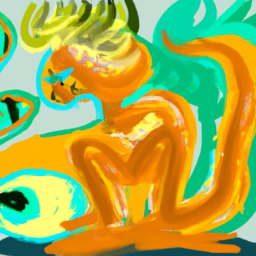Have you ever experienced frustration when trying to throw a powerful punch in a dream, only to find it weak and ineffective? The phenomenon of dreaming about feeble punches is common among many people. In this blog post, I will delve into the scientific reasons behind this interesting occurrence.
In this article, I’ll explore the reasons why punches are weak in dreams, including the role of REM sleep, sensory information, emotions, and memory.
Dreams have fascinated humans for centuries, and scientists have been studying them for decades. One of the most intriguing aspects of dreams is the way they can feel so vivid and real, yet so different from waking life.
One common experience in dreams is trying to throw a punch, only to find that it’s weak and ineffective. This phenomenon has puzzled people for ages, but recent research has shed some light on why it happens. By understanding the science behind weak punches in dreams, we can gain a deeper understanding of the brain and the way it processes information.
Key Takeaways
- The weakness of punches in dreams is likely due to the brain’s inability to fully simulate physical force, as well as the emotional state of the dreamer.
- Dream perception can be influenced by recent experiences and emotions, and accurate memory consolidation plays a crucial role in shaping the vividness and emotional intensity of dream content.
- Studying the neural mechanisms behind weak punches in dreams can provide insights into how the brain coordinates and executes voluntary movements, which could have implications for treating movement disorders and developing therapies for neurological conditions.
- Dreams are connected to consciousness, and understanding the science behind dream experiences can provide a deeper understanding of the brain and the way it processes information.
The Science of REM Sleep
During REM sleep, our muscles become temporarily paralyzed and relaxed because the body doesn’t want to act out our dreams. The brain sends signals to our muscles to turn off, except for the muscles that control our breathing and eye movements.
It’s during this time that we may attempt to throw a punch in our dream, only to feel like our arm is moving in slow motion or that we’re not putting enough force behind the punch. However, this paralysis doesn’t mean that our brain isn’t still active. In fact, during REM sleep, our brain is just as active, if not more so, than when we’re awake.
This is why we can still experience vivid dreams, even though our body isn’t physically reacting to them. The brain is still processing sensory information and creating a simulated environment for us to experience. This is where the role of sensory information in perception comes into play.
The Role of Sensory Information in Perception
Sensory information plays a crucial role in shaping our perception of the world around us. Our brains receive information from our senses and use it to create the reality that we experience. This process is not always accurate, as our brains can be influenced by external factors such as emotions, expectations, and past experiences.
One way that sensory information can affect our perception is through the phenomenon known as sensory adaptation. This occurs when our brains become desensitized to a particular sensory input over time. For example, if you are in a room with a strong smell, you may initially notice it, but after a while, your brain will adapt and the smell will no longer be as noticeable. This adaptation can be useful in allowing us to focus on more important sensory information, but it can also lead to inaccuracies in our perception.
As we delve deeper into the role of sensory information in perception, we begin to see how complex and dynamic our perception truly is. However, it is not the only factor that affects our dreams. In the next section, we will explore how emotions can impact our perception of dreams and why punches may feel weak in our dreams.
The Effect of Emotions on Dream Perception
Emotions can greatly influence how we perceive our dreams, as they can alter the vividness and emotional intensity of dream content. For example, a person who’s feeling anxious may have a dream that feels like they’re trapped in a small, constricting space, while someone who’s feeling happy may have a dream that feels like they’re floating on a cloud.
This illustrates how emotions can act like a lens, shaping the way we see and experience our dreams. In terms of dream fighting, the emotions we feel during a dream can affect the power and intensity of our punches. If we’re feeling strong and confident, our dream punches may feel more powerful and effective.
On the other hand, if we’re feeling weak or scared, our dream punches may feel weak and ineffective. These emotional influences on dream perception can help explain why dream fighting can have such cultural significance.
The Cultural Significance of Dream Fighting
Dream fighting holds a significant place in various cultures, with its portrayal in media and entertainment captivating audiences worldwide. From ancient myths to modern action movies, the idea of battling in dreams has been explored in different ways.
In some cultures, dream fighting is believed to have spiritual or magical significance. For instance, in traditional Chinese culture, martial arts practitioners often train to fight in dreams as a way of honing their skills and connecting with their inner selves.
Dream fighting also has psychological significance. It is often seen as a manifestation of our inner conflicts and desires. In dreams, we may fight against our fears, doubts, and insecurities, or express our repressed anger and frustration.
However, the relationship between dreams and reality is complex, and dream fighting may not always reflect our true selves or abilities. As we explore this topic further, we will uncover the mysteries of dream fighting and the reasons behind the weakness of punches in dreams.
The Relationship Between Dreams and Reality
The connection between our subconscious mind and our waking reality is a complex and intriguing subject. It’s fascinating how our experiences, thoughts, and emotions during the day can be processed and transformed into dreams at night.
However, the line between dreams and reality can sometimes be blurred, making it difficult to determine which is which. For example, have you ever woken up from a dream and struggled to shake off the emotions and sensations it left you with? Or have you ever had a dream that felt so real, you were convinced it had actually happened?
Our dreams can be influenced by our experiences and memories, but they can also shape our perception of reality. Sometimes, we may even confuse memories with dreams or vice versa. This is because our brain processes and stores information in a similar way during both wakefulness and sleep.
Understanding the relationship between dreams and reality can help us better understand ourselves and our experiences. With that said, let’s take a closer look at the role of memory in dream perception.
The Role of Memory in Dream Perception
I’ve always been fascinated by the role of memory in the way we perceive dreams.
From what I’ve read, there are two main processes at play: long-term memory consolidation and short-term memory processing.
Long-term memory consolidation is responsible for incorporating our dreams into our overall memory bank.
Short-term memory processing helps us make sense of the dream as it’s happening.
I’m looking forward to exploring this topic further and learning more about how our memories affect our dream perceptions.
Long-Term Memory Consolidation
During sleep, the brain consolidates long-term memories, which may affect the perception of physical strength in dreams. This process involves the transfer of information from short-term memory to long-term memory, which strengthens the neural connections and enhances the retention and retrieval of the information. As a result, the brain can access and manipulate the stored memories during dreaming, creating a virtual reality that simulates the experiences and emotions of wakefulness.
However, the accuracy and intensity of dream perception can vary depending on the quality and quantity of the memory consolidation process. For example, if the brain fails to consolidate a recent experience into long-term memory, the dream representation of that experience may be incomplete, distorted, or even absent. Likewise, if the brain consolidates a memory that is weak or ambiguous, the dream representation of that memory may be vague, uncertain, or inconsistent. Thus, the strength of punches in dreams may depend on the extent to which the brain consolidates the motor skills, muscle memory, and emotional context of punching into long-term memory.
As we explore the role of memory in dream perception, we can also examine the effects of short-term memory processing on dream content.
Short-Term Memory Processing
When processing short-term memory, I’ve noticed that recent experiences can heavily influence the content of my dreams. This includes the details and emotions that I’ve experienced throughout the day.
Since short-term memory is still in the process of being consolidated into long-term memory, it’s more susceptible to being altered by outside factors such as stress, emotions, and even physical sensations.
This could explain why punches may feel weaker in dreams. If the individual didn’t experience a physical sensation of punching something recently, their brain may not have an accurate representation of what it feels like to throw a punch. As a result, the dreamer may perceive their punches as weaker than they actually are in reality.
This highlights the connection between dreams and consciousness, as our experiences in the waking world can heavily influence what we dream about.
The Connection Between Dreams and Consciousness
I find it fascinating how dreams are connected to our consciousness.
There are various theories of consciousness that try to explain how we become aware of ourselves and our surroundings.
Additionally, neuroscience has shed light on the complex process of self-awareness and how it may relate to our dream experiences.
Theories of Consciousness
Although theories of consciousness vary widely, some suggest that the weakness of punches in dreams could be due to the brain’s inability to fully simulate physical force. According to these theories, the brain isn’t able to generate the same level of neural activity during sleep as it does when we’re awake and physically active. As a result, the brain isn’t able to produce the same level of muscle activity that would be required to execute a powerful punch in a dream.
Another theory suggests that the weakness of punches in dreams could be related to the emotional state of the dreamer. Some researchers believe that emotions play a significant role in the way we experience dreams, and that the intensity of emotions can influence the physical sensations we experience in our dreams. This theory suggests that the weakness of punches in dreams may be related to a lack of emotional arousal, which in turn limits the brain’s ability to simulate physical force.
Understanding the connection between emotions and physical sensations in dreams is an important part of the neuroscience of self-awareness.
The Neuroscience of Self-Awareness
As I continue to explore the various theories of consciousness, I can’t help but be drawn to the neuroscience of self-awareness. It’s fascinating to think about how our brains are able to create a sense of self, and how this affects our perception of the world around us.
In exploring this topic, I’ve come across some interesting insights that have helped me to better understand the complexity of the brain. Here are a few examples:
- The prefrontal cortex is responsible for our ability to reflect on our own thoughts and emotions.
- The insula plays a key role in our ability to empathize with others.
- The anterior cingulate cortex is involved in our ability to regulate our own emotions.
Understanding these different regions of the brain and their functions has given me a greater appreciation for the complexity of consciousness. It’s clear that there is still so much we have yet to learn about the brain and how it creates our sense of self.
Moving on to the next topic, it’s interesting to think about the implications of weak punches in dreams for understanding the brain.
The Implications of Weak Punches in Dreams for Understanding the Brain
You might be surprised to learn that the implications of weak punches in dreams can provide valuable insights into how the brain works. As a dream researcher, I’ve come across numerous cases where people report throwing punches in their dreams, only to find that they’re weak and ineffective.
This phenomenon can be explained by the fact that during sleep, the brain partially shuts down the motor cortex, the area responsible for controlling voluntary movements. As a result, the muscles in our body aren’t able to fully engage, leading to a feeling of weakness.
This weakness in punches during dreams has important implications for understanding the brain’s functioning. It suggests that the brain has a complex way of controlling movements, relying on a combination of sensory feedback and motor commands. It also highlights the importance of the motor cortex in initiating and controlling movements.
By studying the neural mechanisms behind weak punches in dreams, we can gain a better understanding of how the brain coordinates and executes voluntary movements, which can have implications for treating movement disorders and developing new therapies for patients with neurological conditions.
Frequently Asked Questions
How do dreams affect our physical bodies?
Dreams can affect our physical bodies in various ways, such as causing muscle twitches or changes in heart rate. However, the reason why punches feel weak in dreams is still unknown and subject to debate among researchers.
Can lucid dreaming improve our ability to defend ourselves in real life?
Lucid dreaming can improve our skills by allowing us to practice scenarios in a safe environment. It can enhance our muscle memory and reaction time. However, dream punches are weak due to the brain’s suppression of muscle activity during sleep.
Are there any cultural or societal factors that influence dream fighting?
I think cultural and societal factors can influence dream fighting. For example, if someone has been taught to avoid violence, they may not fight back as strongly in their dreams.
Is there a correlation between dreaming and mental health?
I’ve heard the phrase “sweet dreams”before, but it turns out there might be some truth behind it. Studies have shown that dreaming can be linked to mental health, with those who experience frequent nightmares or disrupted sleep often reporting higher levels of anxiety and depression.
Can medications or substances affect the strength of punches in dreams?
Medications or substances can affect the strength of punches in dreams. For example, certain sleep aids may cause muscle relaxation, leading to weaker punches. It’s important to talk to a healthcare provider about any concerns regarding medication and dreaming.
Conclusion
So there you have it – the mystery of weak punches in dreams may never be fully solved. However, we can begin to piece together a greater understanding of the complex relationship between our dreams and our consciousness by exploring the science of REM sleep, the role of sensory information in perception, the effect of emotions on dream perception, and the cultural significance of dream fighting.
But perhaps the most intriguing implication of weak punches in dreams is what it reveals about the limitations of our brains. As we continue to delve deeper into the mysteries of the mind, we may uncover even more surprising truths about the way we perceive and experience the world around us. Who knows what other secrets our dreams may hold? The journey to uncovering them is sure to be a fascinating one.










